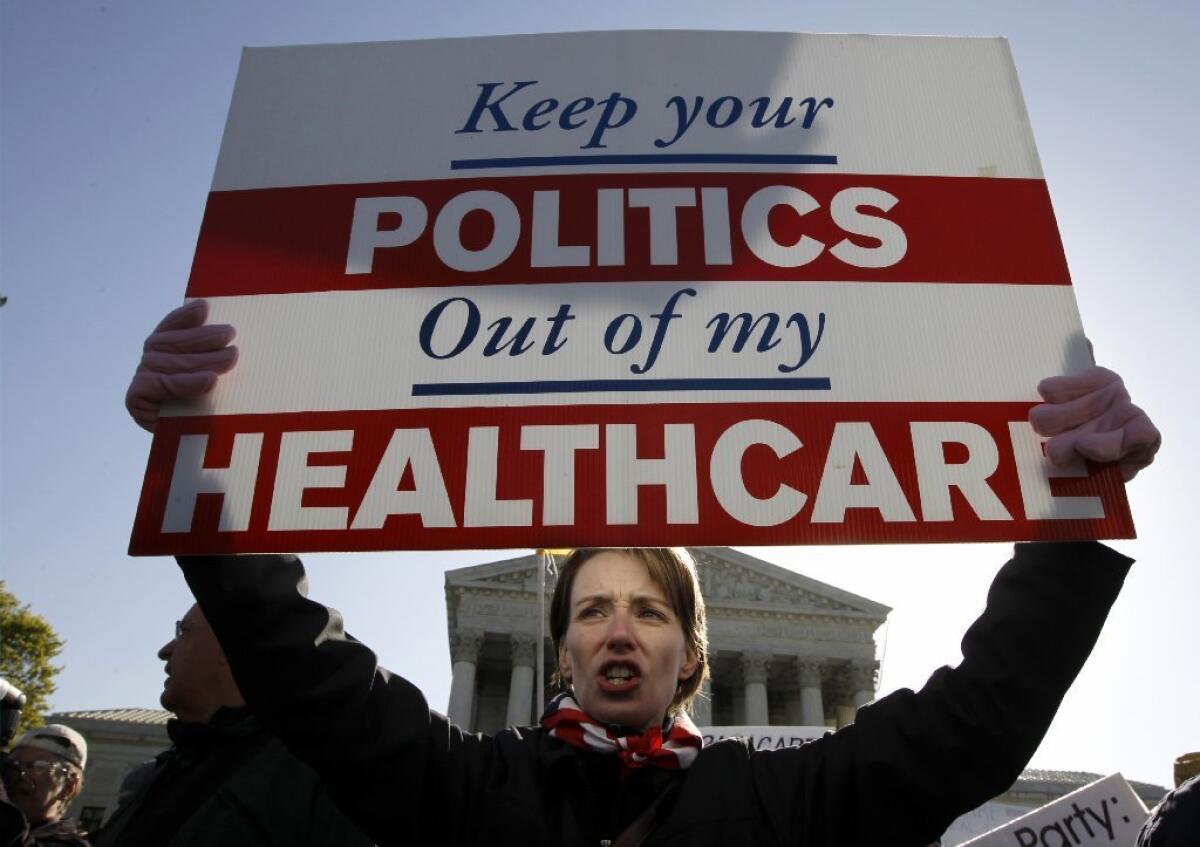Column: Defending Obamacare: ‘Don’t agonize. Organize’

Day 1. That’s when President-elect Donald Trump says he expects Congress to send him a bill repealing Obamacare, which he says he’ll sign.
And more than 20 million Americans will lose health coverage.
“There’s no way to sugarcoat any of this,” said Gerald Kominski, director of the UCLA Center for Health Policy Research. “We’re about to throw 20 million people under a bus.”
This isn’t an abstract policy issue. It’s not theoretical. These are people with chronic diseases. These are sick children. These are your friends and neighbors.
“We’ll go back to what we had before,” Kominski told me. “We’ll have 260 million people who are happy with their insurance and don’t want to change anything, and 50 million who don’t have insurance.”
The Affordable Care Act didn’t fully work out as supporters had hoped. Yes, it ended the miserable practice of people being denied coverage because of pre-existing medical conditions. It emphasized preventive care. It let parents keep their kids on family policies to the age 26.
But it didn’t do much to lower treatment costs. It barely touched drug prices. It didn’t make healthcare markets more competitive and transparent.
Improvements were needed — as is always the case with complex legislation after it encounters real-world conditions. Larger subsidies could have addressed affordability issues as insurers acclimated to the new market. Higher fines for not buying insurance could have brought more healthy people into the fold and kept costs down.
But such changes never happened. Thanks to vehement Republican opposition and obstructionism, Obamacare was never given a chance to succeed.
Like a new car, it started losing value as soon as it hit the road.
At this point, we know precious little about what could replace the Affordable Care Act. Trump and Republican lawmakers have offered only the sketchiest details of what they might offer as a replacement.
It’s likely there would be no mechanism to insure people with pre-existing medical conditions. Denial of coverage in such cases was one of the main reasons millions were uninsured prior to Obamacare.
So-called guaranteed issue — coverage for all, regardless of condition — isn’t economically viable unless insurers also expand their ranks of healthy people to balance things out. That’s a key reason single-payer systems work in nearly all other developed countries. There’s a mandate that everyone take part, sick and healthy, young and old.
Not one Republican plan to replace Obamacare includes such a mandate. Not one.
“If they don’t have a mandate, the whole thing unravels,” said Alain Enthoven, a Stanford University health economist. “You need a way to get young, healthy people into the program.”
Most Republican plans feature a pledge that you’d be able to keep your coverage as long as you don’t let it lapse. But people don’t let coverage lapse because they want to. It happens because they lose a job or face a similarly catastrophic financial reversal.
Once that happens, under Republican proposals, people with pre-existing conditions again would be left out in the cold.
“If the Republicans succeed in repealing the Affordable Care Act, it will cause many tons of hurt to a huge number of people,” said Ron Pollack, executive director of the advocacy group Families USA. “We are looking at a giant step backward.”
During the campaign, Trump advocated for allowing private insurers to offer policies across state lines, as opposed to the current system of each state regulating its own insurance market. He said this would increase competition and thus lower costs and improve quality of coverage.
Most healthcare experts say just the opposite is likely. They point to another industry that adopted this approach: credit cards.
Since the late 1970s, credit cards have been governed by the regulations of the issuer’s home state, rather than on a state-by-state basis. That allowed states desiring more banking jobs, such as Delaware and South Dakota, to opportunistically do away with consumer safeguards and serve as the legal home for plastic offered nationwide.
That’s why other states’ usury laws don’t apply, and why interest rates can soar without warning.
Experts say the same dynamic would play out in the insurance market. If Nevada, say, established itself as a state with lax insurance regulations, insurers would rush to set up shop there and sell policies far and wide that no longer have to meet more stringent regulatory standards of the states were the policyholders live.
“It’s a race to the bottom,” said UCLA’s Kominski. “It’s no longer about consumer protection. It’s about protecting the insurance company.”
It’s possible such concerns are premature. Democratic senators likely would filibuster to block changes to Obamacare. There could be room for compromise solutions.
On the other hand, Republicans might counter a filibuster with budgetary maneuvers that would target key elements of the law, calling into question the implementation of remaining provisions. Some might be easily repealed, others could be crippled by lack of funding.
Think of it like Jenga. You start pulling out a few blocks and before you know it the whole thing is collapsing.
My biggest worry is that it took us this long to address issues that overshadowed our medical system for generations. It was a Herculean task for all involved to pass the incremental improvements brought about by Obamacare.
I wonder if it will take decades more to once again muster the political will to tackle these costly and complicated matters.
If so, are we doomed to remain the one developed country that regards healthcare as a privilege instead of a right?
Will we foolishly continue paying more than double what our economic peers pay for healthcare while receiving fewer benefits? We spend an average $9,400 per person annually on healthcare. The average for members of the European Union is $3,600.
Pollack at Families USA said the fight to defend the Affordable Care Act has begun. On Wednesday, he led a first conference call in which consumer advocates and others came together to talk strategy.
“Don’t agonize,” he told me. “Organize.”
David Lazarus’ column runs Tuesdays and Fridays. He also can be seen daily on KTLA-TV Channel 5 and followed on Twitter @Davidlaz. Send your tips or feedback to [email protected].
MORE FROM LAZARUS
Phone industry’s Robocall Strike Force not yet ready for battle
Why the Justice Department gets it wrong in lawsuit over Dodgers channel
This couple put $1,000 on gift cards. But then the money disappeared
More to Read
Inside the business of entertainment
The Wide Shot brings you news, analysis and insights on everything from streaming wars to production — and what it all means for the future.
You may occasionally receive promotional content from the Los Angeles Times.











